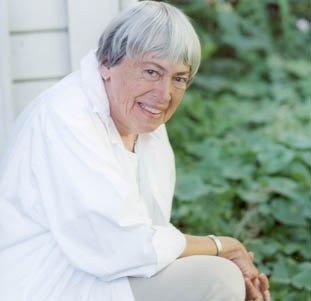"The unread story is not a story; it is little black marks on wood pulp. The reader, reading it, makes it live: a live thing, a story." - Ursula K. Le Guin
Here in New Zealand it is NZ Book Month, and I am dedicating my month (or at least, whatever free time I can scape off the bottom of the barrel of my diary) to Ursula K. Le Guin. For those of you who don't recognize the name, or do recognize it but can't quite seem to recall exactly where you know it from, she is a multi-award winning fantasy author of the famous book series Earthsea. The first of the series, A Wizard of Earthsea, has won prizes, been made into movies and television series, and has been read and loved by generations of fantasy enthusiasts.
Why had no one ever tied me down, threatened me, bribed me, done something just to make me read this book? What kind of friends do I have?! Needless to say, I immediately went online and found the rest of the books. I purchased A Wizard of Earthsea, The Tombs of Atuan, The Farthest Shore and Tehanu all in one brilliant combined edition. It took me about a week (including one memorable Sunday spent on a coach in the sun, dug into Tehanu like a tick) to finish all the books, and then begin the collection of short stories.
It's impossible to say which were my favorite, because each book was so uniquely different from the last. The energy and atmosphere, and the confrontations placed before the protagonists, were all so individual -- each individual book has its own spirit, its own mana.
While The Farthest Shore is a wonderful epic quest to save the world, The Tombs of Atuan is quieter, more psychological tale -- a story about saving just one soul, trapped in a dark and terrifying place in life.
Shortly after (in a fever of Earthsea madness) I rented the animated Studio Ghibli move Tales From Earthsea from the local video store. I had watched the movie a few years earlier when it was a new release, and enjoyed it, though it didn't leave as much of an impression as other Studio Ghibli films, such as My Neighbor Totoro and Howl's Moving Castle. But at that time, I hadn't read the books yet.
While I believe Ursula Le Guin was disappointed by the eventual product made by the studio, I found myself appreciating what it attempted to achieve. The plot is a melting pot of several Earthsea books, all mixed together in one movie. The Farthest Shore stands out more than the other books as an important influence, but elements from A Wizard of Earthsea and Tehanu are strong also.
Despite this obvious let down, there are elements which save it.
For one, the movie provides beautiful, artistic, and even painterly, representations of the world of Earthsea. There is also an amazing soundtrack (with some impressive Scottish-sounding airs) to accompany the film, providing Earthsea with an atmosphere of magic that suits the fantasy world quite well. Despite the somewhat butchered storyline, Tales of Earthsea provides visual and auditory sensory experiences that both satisfy and inspire.
As life goes in circles and cycles, Ursula Le Guin has begun to penetrate not only my spare time, but also my studies. For my paper Cultures of the Supernatural, I am studying fantasy, horror and fairy-tales for their literary merit -- and with quite a sizable essay on the horizon, I have begun searching my University library high and low for essays, critiques and theories on the subject of the fantastic. In doing so, I stumbled upon the collection of essays The Language of the Night by Ursula Le Guin (edited by Susan Wood).
The essays are wonderful, lyrical, and just as awe-inspiring as her works of fiction. She considers and argues on subjects concerning fantasy fiction, science fiction, writing, creativity, and publishing. Here is one quote to give you a taste:
"For fantasy is true of course. It isn't factual, but it is true. Children know that. Adults know it too, and that is precisely why many of them are afraid of fantasy. They know that its truth challenges, even threatens, all that is false, all that is phony, unnecessary, and trivial in the life they have let themselves be forced into living. They are afraid of dragons, because they are afraid of freedom." - from her essay, Why Are Americans Afraid of Dragons?
Why, indeed?
So, do you need any more cajoling and bossing? More peer pressure and pushing? Go, go forth! Go to your library, your favorite bookstore -- anywhere! -- and find something, anything, by Ursula Le Guin and read it! Go to her website and check out her excerpts, and some essays. Shoo! SHOO! *waves arms frantically*






Have you read "The Left Hand of Darkness"? I recommend it.
ReplyDelete